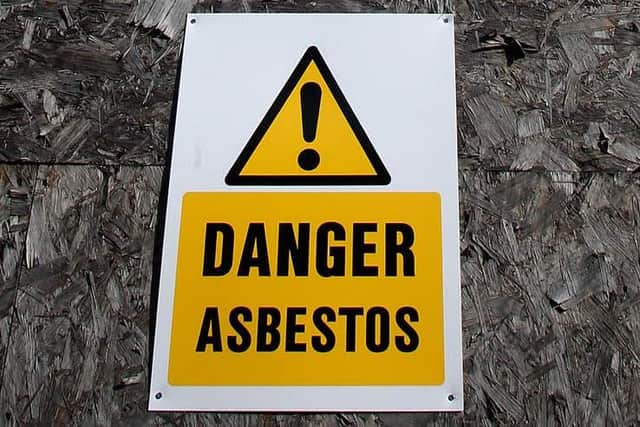MPs' inquiry reveals Derbyshire Dales deaths linked to asbestos as campaigners highlight risk in schools
and live on Freeview channel 276
The Work and Pensions Committee, which launched the inquiry, said that despite the importation, supply and use of asbestos being banned in the UK since 1999, it remains the largest single cause of work-related fatalities.
Health and Safety Executive (HSE) data released to MPs showed that mesothelioma, a type of cancer affecting the lining of some organs, was responsible for 58 deaths in Derbyshire Dales between 1981 and 2019.
Advertisement
Hide AdAdvertisement
Hide Ad15 occurred between 2015 and 2019 – the highest number recorded in any five-year period since records began and one more than in 2010-14.


Liz Darlison, chief executive of the charity Mesothelioma UK, said she was shocked at the figures, which show that 12,500 people died of mesothelioma across Britain in 2015-19 – the highest number for any previous five-year period.
She said: “Our country is riddled with the stuff and we have to address this if we want to protect future generations.
“We need a long-term, government-led initiative to remove asbestos, even if it takes several generations.”
Advertisement
Hide AdAdvertisement
Hide AdMore than 5,000 deaths each year are caused by diseases linked to asbestos, which also include lung cancer and asbestosis – although symptoms may not arise for up to 40 years after exposure.
Traditionally higher levels of asbestos-related illness were associated with industrial sites such as shipyards, but in recent years it has spread in other sectors including schools and hospitals.
Dawn McKinley, chairman of the UK Mesothelioma Alliance, said: “Teachers, former pupils, school janitors, cleaners and canteen staff are dying from asbestos-related cancer and mesothelioma, and the numbers are increasing.
“The dose level required to contract mesothelioma is extremely small. Our politicians, duty holders and decision makers must come together and use their powers to protect our children from the real dangers they face.”
Advertisement
Hide AdAdvertisement
Hide AdThe MPs’ inquiry will examine the workplace risks posed by asbestos, actions taken by the HSE to mitigate them and how its approach compares to other countries.
The HSE has committed to working with MPs throughout the inquiry and said targeting asbestos risk has been and remains a priority, and that the incidence of mesothelioma was expected to decline in the coming years.
A spokesman said: “Sadly, the damage from exposure to asbestos takes many decades to show itself. This means that cases now, and in the recent past, normally result from exposures which predate the time during the 1980s when the regulations and work practices were significantly tightened.
“Asbestos is, however, still present in older buildings given its previous uses and it must be managed appropriately.”